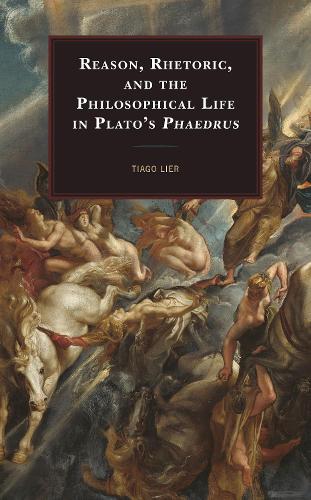
Reason, Rhetoric, and the Philosophical Life in Plato's Phaedrus
(Paperback)
Available Formats
Publishing Details
Reason, Rhetoric, and the Philosophical Life in Plato's Phaedrus
By (Author) Tiago Lier
Bloomsbury Publishing PLC
Lexington Books
14th March 2022
United States
Classifications
Professional and Scholarly
Non Fiction
184
Physical Properties
Paperback
298
Width 154mm, Height 219mm, Spine 20mm
413g
Description
Plato is a well-known critic of rhetoric, but in the Phaedrus, he defends the art of rhetoric, arguing that it can be perfected with the aid of philosophy. In Reason, Rhetoric, and the Philosophical Life in Platos Phaedrus, Tiago Lier provides a new and comprehensive interpretation of this important dialogue. He argues that Platos defense of rhetoric is based on philosophys ethical nature, and that philosophy is a way of life rather than a body of knowledge. For Plato, an essential element of both rhetoric and the philosophical life is that every use of speech, whether to persuade or to learn, depends upon the psychology of the speaker and the audience. Lier shows how Socrates develops a dynamic account of this psychology over the course of the dialogue in order to help Phaedrus understand how he is personally engaged in, and shaped by, every act of communication. Only when we grasp the tension between eros and logos will we discover the limitations of the art of rhetoric and that rhetoric alone cannot show us what we truly desire. Instead, Lier concludes, the greatest power of speech is to reveal to ourselves our own desires and understanding of our place in the world. This continual self-reflection is the philosophical life around which Socrates and Plato fashion their distinctive forms of rhetoric.
The insights developed in this book will be of particular relevance to students and scholars of ancient philosophy, classics, and rhetorical theory, but it will also be of interest to those working in political science, literary studies, and communication studies.
Reviews
Masterfully blending textual exegesis and philosophical reconstruction, Tiago Lier shows that the apparently disjointed elements of Plato's Phaedrus form parts of an organically connected and powerful whole. By examining both the drama and the arguments of the dialogue, Lier offers a provocative interpretation of Platonic eros and logos that will lead readers to rethink the modern world's reflexive disdain for rhetoric. -- Ryan K. Balot, University of Toronto
The Platonic Socrates is well-known for his critique of the Sophists' claim that the art of politics is synonymous with the art of deceptive rhetoric. But as Tiago Liers new book impressively demonstrates, Socrates longer range concern was to replace the selfishly motivated rhetoric of the Sophists with a just rhetoric that was philosophically guided by an understanding of the souls eros for knowledge of the eternal Good. As such, Platos Phaedrus is the fundamental dialogue for exploring how this new Socratic art of rhetoric both contributes to justice in the city by shaping the character of the citizenry and is a therapeutic experience for the rhetorician himself. From now on, all reflections on this key Platonic dialogue will have to begin by encountering this original and penetrating study. -- Waller R. Newell, Carleton University
Author Bio
Tiago Lier holds a doctorate in political science and is a research administrator at the University of Calgary.
